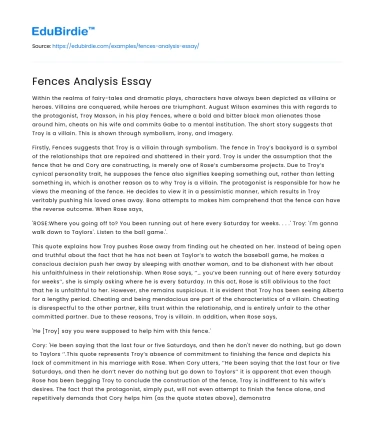Within the realms of fairy-tales and dramatic plays, characters have always been depicted as villains or heroes. Villains are conquered, while heroes are triumphant. August Wilson examines this with regards to the protagonist, Troy Maxson, in his play Fences, where a bold and bitter black man alienates those around him, cheats on his wife and commits Gabe to a mental institution. The short story suggests that Troy is a villain. This is shown through symbolism, irony, and imagery.
Firstly, Fences suggests that Troy is a villain through symbolism. The fence in Troy’s backyard is a symbol of the relationships that are repaired and shattered in their yard. Troy is under the assumption that the fence that he and Cory are constructing, is merely one of Rose’s cumbersome projects. Due to Troy’s cynical personality trait, he supposes the fence also signifies keeping something out, rather than letting something in, which is another reason as to why Troy is a villain. The protagonist is responsible for how he views the meaning of the fence. He decides to view it in a pessimistic manner, which results in Troy veritably pushing his loved ones away. Bono attempts to makes him comprehend that the fence can have the reverse outcome. When Rose says,
Save your time!
We can take care of your essay
- Proper editing and formatting
- Free revision, title page, and bibliography
- Flexible prices and money-back guarantee
'ROSE:Where you going off to? You been running out of here every Saturday for weeks. . . .' Troy: 'I'm gonna walk down to Taylors'. Listen to the ball game.'.
This quote explains how Troy pushes Rose away from finding out he cheated on her. Instead of being open and truthful about the fact that he has not been at Taylor’s to watch the baseball game, he makes a conscious decision push her away by sleeping with another woman, and to be dishonest with her about his unfaithfulness in their relationship. When Rose says, ‘’… you’ve been running out of here every Saturday for weeks’’, she is simply asking where he is every Saturday. In this act, Rose is still oblivious to the fact that he is unfaithful to her. However, she remains suspicious. It is evident that Troy has been seeing Alberta for a lengthy period. Cheating and being mendacious are part of the characteristics of a villain. Cheating is disrespectful to the other partner, kills trust within the relationship, and is entirely unfair to the other committed partner. Due to these reasons, Troy is villain. In addition, when Rose says,
'He [Troy] say you were supposed to help him with this fence.'
Cory: 'He been saying that the last four or five Saturdays, and then he don't never do nothing, but go down to Taylors ‘’.This quote represents Troy’s absence of commitment to finishing the fence and depicts his lack of commitment in his marriage with Rose. When Cory utters, ‘’He been saying that the last four or five Saturdays, and then he don’t never do nothing but go down to Taylors’’ it is apparent that even though Rose has been begging Troy to conclude the construction of the fence, Troy is indifferent to his wife’s desires. The fact that the protagonist, simply put, will not even attempt to finish the fence alone, and repetitively demands that Cory helps him (as the quote states above), demonstrates the scarcity of his respect towards Rose. In a relationship, both partners must be willing to act as a team to help each other. Respectively, Troy must be willing to help his other half. While Rose takes care of the house chores, and uplifting the family dynamic that Troy is breaking, the least that Troy could do, apart from complaining about how difficult life is, is please his wife by putting up the fence. The fence seemed to be described as completed, solely at the end of the play, when Troy perishes, and his family reunites. The completion of the fence illustrates the resilience of the Maxson family and paradoxically the strength of Troy who tears them apart, but also brings them back together one more time when he perishes. Wilson demonstrates that Troy is a villain through symbolism.
Secondly, Fences suggests that Troy is a villain through irony. Troy constructs the fence around his backyard to avert mortality from invading and take him over to the other side. The protagonist articulates, addressing death, 'I'm gonna build me a fence around what belongs to me. And then I want you to stay on the other side.' However, in the final acts, death surpasses the fence and reaches him, and the Maxsons are present at his memorial. The irony is evident when the protagonist fabricates the fence on the perimeters of his disintegrating house as an attempt to shield himself, nonetheless, decease trespasses the fence and greets him to the afterlife.
In addition, as an occupation, the protagonist desires to drive the garbage truck rather than executing the redundant and unwieldy responsibilities of lifting garbage. Troy yearns becoming the first dark-hued chauffeur, and his objective is realized. Though, his new profession is making him feel sorrowful rather than content. He says, 'Ain't got nobody to talk to. . . . Feel like you working by yourself.' He surmises that the alteration and job upgrade will result in gleefulness, when, Tory undergoes isolation and depression.HOW DOES THIS MAKE HIM A VILLAIN?????
Thirdly, Fences suggests that Troy is a villain through imagery.






 Stuck on your essay?
Stuck on your essay?

